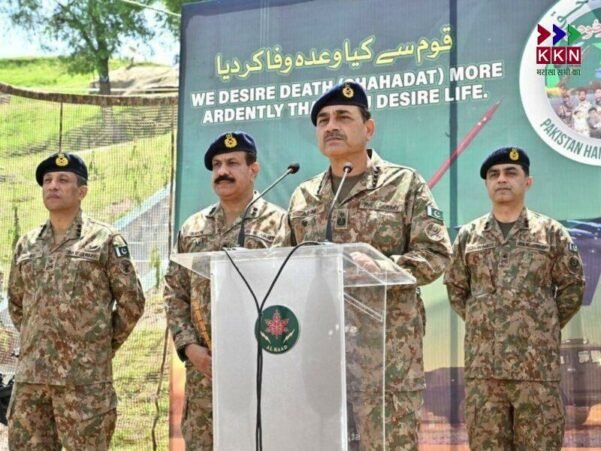KKN Gurugram Desk | The White House has officially denied rumors of Pakistani Army Chief General Asim Munir being invited to the U.S. Army’s 250th Anniversary parade in Washington, D.C., on June 14, 2025. The clarification comes amid heightened diplomatic tensions between India and Pakistan following recent cross-border events.
Article Contents
U.S. Army 250th Anniversary Celebrations Trigger Global Attention
Washington, D.C., is hosting grand celebrations on June 14, 2025, marking the 250th anniversary of the United States Army, a significant event in American military history. The celebration, which includes a military parade on Constitution Avenue and a full-day exhibition on the National Mall, has attracted global media attention.
The occasion coincides with the 79th birthday of U.S. President Donald Trump, who is expected to address the public during the festivities.
However, what initially appeared to be a patriotic military celebration turned into an unexpected diplomatic flashpoint when unverified reports claimed that Pakistani Army Chief Field Marshal Asim Munir had been invited as a special guest to the event.
White House Denies Reports: “No Foreign Military Leaders Invited”
Amid growing speculation in South Asian media and political circles, the White House issued a formal statement dismissing the reports as “entirely false.” A senior official clarified that no foreign military leader, including General Munir, was invited to the U.S. Army Day parade.
“This report is completely inaccurate. No foreign military leaders have been invited to the 250th Army Day celebrations,” the White House stated.
The clarification was made necessary due to the sensitive nature of regional politics in South Asia, particularly amid rising tensions between India and Pakistan following recent militant activity in Kashmir.
Controversy in South Asia: Operation Sindoor and the Pahalgam Attack
The issue became more controversial following India’s recent Operation Sindoor, a retaliatory military campaign targeting nine terrorist bases in Pakistan and Pakistan-occupied Kashmir (PoK). The operation was launched in response to the Pahalgam terrorist attack, which claimed 26 lives. India has blamed Pakistan-backed terror outfits for the attack.
In light of these tensions, the rumored invitation to General Munir was seen as a major diplomatic blow to India, especially considering Munir’s previous anti-India remarks and inflammatory rhetoric just days before the Pahalgam tragedy.
Opposition in India Reacts Sharply
The speculative news also triggered political backlash in India. Senior Congress leader Jairam Ramesh issued a sharp statement criticizing the alleged move:
“General Asim Munir is known for provocative statements about the two-nation theory and inciting religious divisions. To imagine such a person being invited by the United States is beyond comprehension,” he said.
Ramesh emphasized Munir’s direct association with extremist ideologies and blamed him indirectly for the recent upsurge in violence along the Line of Control (LoC).
U.S. Analysts: “A Potential Diplomatic Setback for India”
Defense analyst Derek Grossman from RAND Corporation also commented on the rumors, stating that such an invitation would be seen as a “diplomatic setback for India.” However, following the official denial from the White House, Grossman and other observers now regard the situation as a classic case of misinformation potentially originating from politically motivated sources.
Pakistan’s Internal Reactions and PTI USA’s Protest Plans
Interestingly, the reports were also not well received in Pakistan. The U.S. chapter of Pakistan Tehreek-e-Insaf (PTI USA) had planned to protest outside the Pakistani embassy in Washington, D.C., against what it termed as “unofficial martial law” in Pakistan under General Munir’s leadership.
PTI USA, along with 12 other Pakistani diaspora groups, had mobilized supporters for a large-scale protest. However, the White House’s clarification has defused the situation, and the protest was reportedly called off.
Speculations on U.S. Strategy: Was China a Factor?
Some analysts initially speculated that if the invitation were true, it could have been a strategic move by the U.S. to counterbalance China’s growing influence in South Asia. With Pakistan’s strong alignment with China’s Belt and Road Initiative (BRI) and the China-Pakistan Economic Corridor (CPEC), the U.S. may have seen value in drawing Pakistan closer diplomatically.
Some experts suggested the U.S. may have intended to pressure Pakistan into acting against terrorist networks like Jaish-e-Mohammed, Lashkar-e-Taiba, and even TTP (Tehrik-i-Taliban Pakistan). But again, all these narratives were rendered baseless following the U.S. government’s official denial.
Event Details: U.S. Army Day Parade and Celebration
Despite the political drama, the 250th Army Day parade is set to proceed as a grand celebration of American military history and pride. Key highlights include:
-
Participation of 6,600 military personnel
-
Display of 150 military vehicles and 50 helicopters
-
Inclusion of 34 horses, 2 mules, and a military dog
-
A fitness competition, military equipment demonstration, and musical performances
-
The parade route will stretch from Lincoln Memorial to 15th Street along Constitution Avenue
This event is expected to draw thousands of spectators and serve as a patriotic rallying point for Americans nationwide.
The entire episode highlights how unverified media reports and diplomatic speculation can spark geopolitical tensions, especially in regions like South Asia. The White House’s swift denial helped quell rising concerns in New Delhi, Washington, and even Islamabad.




